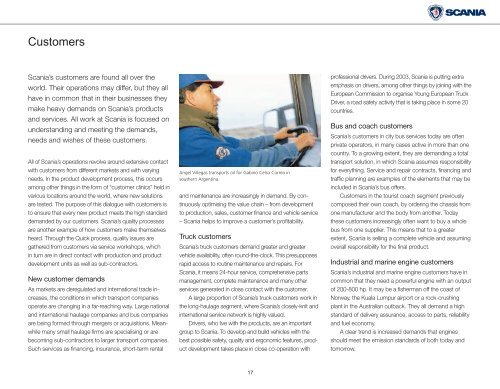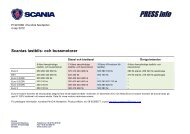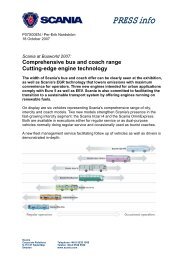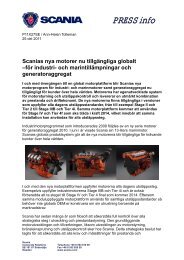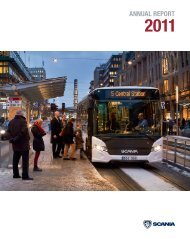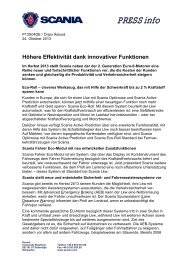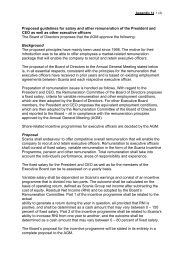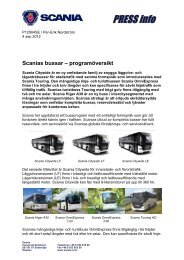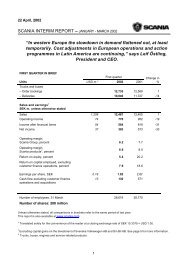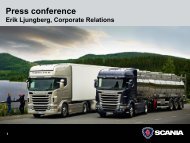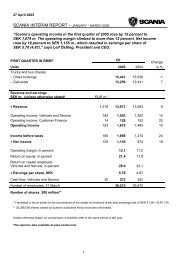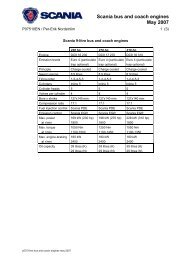Scania annual report 2002
Scania annual report 2002
Scania annual report 2002
Create successful ePaper yourself
Turn your PDF publications into a flip-book with our unique Google optimized e-Paper software.
Customers<br />
<strong>Scania</strong>’s customers are found all over the<br />
world. Their operations may differ, but they all<br />
have in common that in their businesses they<br />
make heavy demands on <strong>Scania</strong>’s products<br />
and services. All work at <strong>Scania</strong> is focused on<br />
understanding and meeting the demands,<br />
needs and wishes of these customers.<br />
All of <strong>Scania</strong>’s operations revolve around extensive contact<br />
with customers from different markets and with varying<br />
needs. In the product development process, this occurs<br />
among other things in the form of “customer clinics” held in<br />
various locations around the world, where new solutions<br />
are tested. The purpose of this dialogue with customers is<br />
to ensure that every new product meets the high standard<br />
demanded by our customers. <strong>Scania</strong>’s quality processes<br />
are another example of how customers make themselves<br />
heard. Through the Quick process, quality issues are<br />
gathered from customers via service workshops, which<br />
in turn are in direct contact with production and product<br />
development units as well as sub-contractors.<br />
New customer demands<br />
As markets are deregulated and international trade increases,<br />
the conditions in which transport companies<br />
operate are changing in a far-reaching way. Large national<br />
and international haulage companies and bus companies<br />
are being formed through mergers or acquisitions. Meanwhile<br />
many small haulage firms are specialising or are<br />
becoming sub-contractors to larger transport companies.<br />
Such services as financing, insurance, short-term rental<br />
Angel Villegas transports oil for Gabino Celso Correa in<br />
southern Argentina.<br />
and maintenance are increasingly in demand. By continuously<br />
optimising the value chain – from development<br />
to production, sales, customer finance and vehicle service<br />
– <strong>Scania</strong> helps to improve a customer’s profitability.<br />
Truck customers<br />
<strong>Scania</strong>’s truck customers demand greater and greater<br />
vehicle availability, often round-the-clock. This presupposes<br />
rapid access to routine maintenance and repairs. For<br />
<strong>Scania</strong>, it means 24-hour service, comprehensive parts<br />
management, complete maintenance and many other<br />
services generated in close contact with the customer.<br />
A large proportion of <strong>Scania</strong>’s truck customers work in<br />
the long-haulage segment, where <strong>Scania</strong>’s closely-knit and<br />
international service network is highly valued.<br />
Drivers, who live with the products, are an important<br />
group to <strong>Scania</strong>. To develop and build vehicles with the<br />
best possible safety, quality and ergonomic features, product<br />
development takes place in close co-operation with<br />
professional drivers. During 2003, <strong>Scania</strong> is putting extra<br />
emphasis on drivers, among other things by joining with the<br />
European Commission to organise Young European Truck<br />
Driver, a road safety activity that is taking place in some 20<br />
countries.<br />
Bus and coach customers<br />
<strong>Scania</strong>’s customers in city bus services today are often<br />
private operators, in many cases active in more than one<br />
country. To a growing extent, they are demanding a total<br />
transport solution, in which <strong>Scania</strong> assumes responsibility<br />
for everything. Service and repair contracts, financing and<br />
traffic planning are examples of the elements that may be<br />
included in <strong>Scania</strong>’s bus offers.<br />
Customers in the tourist coach segment previously<br />
composed their own coach, by ordering the chassis from<br />
one manufacturer and the body from another. Today<br />
these customers increasingly often want to buy a whole<br />
bus from one supplier. This means that to a greater<br />
extent, <strong>Scania</strong> is selling a complete vehicle and assuming<br />
overall responsibility for the final product.<br />
Industrial and marine engine customers<br />
<strong>Scania</strong>’s industrial and marine engine customers have in<br />
common that they need a powerful engine with an output<br />
of 200-800 hp. It may be a fisherman off the coast of<br />
Norway, the Kuala Lumpur airport or a rock-crushing<br />
plant in the Australian outback. They all demand a high<br />
standard of delivery assurance, access to parts, reliability<br />
and fuel economy.<br />
A clear trend is increased demands that engines<br />
should meet the emission standards of both today and<br />
tomorrow.<br />
17


